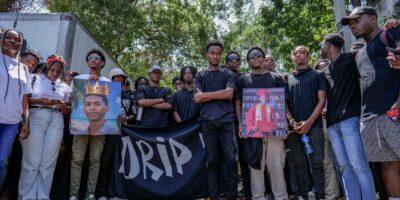This situation, aggravated by the insecurity climate, represents a major challenge for the Haitian health system, already weakened by the lack of specialists in several key areas, according to two officials from the Management of the hospital residence of the State University Hospital contacted by AyiboPost
Deprived of access to their assigned hospitals, medical residents now find themselves without a structured framework to continue their learning.
This situation, aggravated by insecurity, represents a major challenge for the Haitian health system, already weakened by the lack of specialists in several key areas, according to two officials from the Management of the Hospital Residence of the State University Hospital of Haiti (HUEH) contacted by AyiboPost.
To receive a summary of this news every day on WhatsApp, click here.
In Haiti, the public hospital residency, overseen by the Ministry of Public Health (MSPP), is a key stage in medical training. It allows young doctors to move from theory to supervised practice in hospitals. The residency is essential for specializing in surgery, gynecology, or orthopedics and it generally lasts three to four years.
Dr. Samuel Faldor is in his third year of residency training in internal medicine at the State University Hospital of Haiti (HUEH). Forced to interrupt his training due to the hospital’s closure in February 2024, the young physician is worried about his professional future.
« In a situation where training that is supposed to be continuous experiences long interruptions, taking such a long break from studies ends up making you less dynamic, » explains the doctor. Dr. Faldor says he is is forced to compensate by giving courses in other medical facilities.
Alongside the Mirebalais University Hospital (HUM) – closed since April 2025 – and the La Paix University Hospital, the HUEH is one of the country’s major university hospitals. This center, closed since February 2024 following attacks by armed gangs, received around fifty resident doctors each year, spread across twelve departments.
In a situation where training that is supposed to be continuous experiences long interruptions, taking such a long break from studies ends up making you less dynamic
-Dr. Samuel Faldor
The HUM, for its part, welcomed 125 professionals each year for specialized training.
Other medical facilities, usually involved in the specialized training of health professionals, are also affected by the attacks by armed gangs in Port-au-Prince.
This is particularly the case for the Port-au-Prince Sanatorium Hospital, located in Carrefour-Feuille, the main training center for pulmonology doctors. Mars & Klein Hospital, renowned for its psychiatry training on Monseigneur Guilloux Street, and Isaïe Jeanty Maternity Hospital, which trains specialists in gynecology and obstetrics from La Saline, are also at a standstill.
Attempts by authorities to reopen HUEH have failed.
The most recent, initiated in December 2024 by the then minister, Dr. Duckenson Lorthe Bléma, ended in carnage: a direct attack by gangs on the hospital premises left three dead and around ten injured.
« We have practically wasted a year doing nothing, under the watchful eye of totally irresponsible leaders, » laments Dr. Ralph Louisius, a second-year resident in otolaryngology (ENT) at HUEH.
Louisius denounces the passivity of those responsible in the face of this situation.
Disillusioned, the doctor confides that he has lost all motivation and is considering going abroad for other projects. Yet, Louisius is one of only three candidates admitted each year to an ENT residency.
Read also: General Hospital: an unclear reopening in an alarming health crisis
In principle, the selection of those admitted to hospital residency is done through competitive examinations. The postgraduate directors of the Faculty of Medicine and Pharmacy are responsible for organizing these public hospital residency competitions. The process involves all university hospitals in the country and is carried out under the supervision of the MSPP.
A report published by the World Health Organization in 2017 reveals that the country has an average of only 5,9 doctors or nurses, and 6,5 health professionals, per 10,000 inhabitants – figures well below the ten doctors per 10,000 inhabitants recommended by the world organization.
In an article published in April 2023, AyiboPost reported a glaring lack of specialists in key medical fields in Haiti, such as rheumatology, nuclear medicine and transplantation.
This is a worrying situation in a context where the few doctors trained abroad in disciplines not taught in local medical schools – such as vascular surgery or neurosurgery – are ending up leaving the country en masse, according to the testimonies of several sources informed of these departures.
« There is an urgent need to act, » warns Dr. Claudy Lacarte, a urology physician at HUEH, denouncing the collapse of medical knowledge production in Haiti.
According to him, this crisis is weakening training, a pillar of the health system.
Since the center closed Mars & Kline in February 2024 — the only one offering care and training in psychiatry — Dhierry Pierre-Louis, a third-year resident, had to interrupt his studies.
He managed to maintain his profession as best he could by working as a general practitioner in a private clinic.
According to Dr. Faldor, the lack of coordination causes total disorganization within the different classes of resident doctors at HUEH.
« Some of the residents, thanks to personal approaches with their department heads, were able to be reassigned to other health facilities, » Faldor explained to AyiboPost.
But, he continues, this does not apply to all services.
Dr. Marc Seloy, a third-year ophthalmology resident, is currently assigned to the Brenda Strafford Institute, a private facility located in Les Cayes.
This temporary solution comes with its share of challenges. According to Seloy, residents no longer receive the allowances—ranging from 20,000 to 23,000 gourdes—usually paid by the state. They must fend for themselves.
Dr. Hebnanthe Louis is also one of the residents forced to leave their training center to continue their specialization elsewhere in the country.
A pulmonology resident at the Port-au-Prince Sanatorium Hospital, located in Carrefour-Feuilles, she had to be relocated to other facilities since September 2023, following armed gang attacks in the area.
But Hebnanthe Louis says she is concerned about the lack of suitable equipment for her training in these structures.
« The Port-au-Prince Sanatorium Hospital is the only center in the country specializing in the treatment of respiratory diseases. It therefore has a range of specific equipment that is not found in other facilities, » she explained to AyiboPost.
Louis particularly remembers his rotation at Saint-Boniface Hospital in Fonds-des-Blancs last year, where a mechanical ventilator was out of service.
Such a failure hampered care, this device being essential for the treatment of patients in respiratory distress.
Hebnanthe Louis, who was initially part of a class of eight pulmonology specialists, told AyiboPost that there are only two left to continue this training.
Dr. Hebnanthe Louis is also one of the residents forced to leave their training center to continue their specialization elsewhere in the country.
Reached by AyiboPost, Dr. Rodolphe Malebranche, director of the hospital residence at HUEH, expressed doubts about the resumption of training at HUEH, which has been suspended for more than a year.
For the doctor, structural problems have been undermining the system for years.
« For almost fourteen years, the management of the hospital residence and research at HUEH has been operating on a zero budget, » explains Dr. Malebranche, explaining the fragility of this management, which should normally be fully invested in the research issue for the benefit of residents and the hospital in general.
According to Dr. Malebranche, one of the major risks associated with this situation is that « we could lose the international accreditation of the Faculty of Medicine, which would deprive our future doctors and residents of any opportunity to take the exams that would allow them to continue their training and possibly their professional careers in foreign countries, particularly in North America. »
Accreditation is a key requirement for any medical school that wants its degrees recognized abroad. In the case of the United States and Canada, the Educational Commission for Foreign Medical Graduates (ECFMG) sets this standard.
Without ECFMG-recognized accreditation, graduates of Haitian medical schools have no chance of entering specialized or professional programs in North America. This institutional recognition is a prerequisite for taking the exams required to pursue further studies or careers in North American medical systems.
A threat that already weighed on medical faculties, since, in mars 2023, no medical school in Haiti appeared on the list published by the ECFMG.
The Ministry of Public Health and Population is the regulatory authority regarding the training of doctors in the various specialties.
We could lose the international accreditation of the Faculty of Medicine, which would deprive our future doctors and residents of any opportunity to take the exams that would allow them to continue their training and possibly their professional careers in foreign countries, particularly in North America.
-Dr. Malebranche
A document prepared by the Hospital Residence and Research Department published in 2020 provides an overview of the need for essential reform in the department.
The document highlights the lack of clear leadership from the MSPP.
This gap, the text continues, leaves room for a fragmented, sometimes incoherent system, in which recruitment methods, training programs and educational supervision vary greatly from one establishment to another.
Added to this is the urgency of rethinking the administrative and financial autonomy of university hospital institutions.
AyiboPost contacted the MSPP. It did not respond before the publication of this article.
Cover | Photo of a young doctor sitting with both hands on his head. Photo: Freepik
► AyiboPost is dedicated to providing accurate information. If you notice any mistake or error, please inform us at the following address : hey@ayibopost.com
Keep in touch with AyiboPost via:
► Our channel Telegram : Click here
►Notre Channel WhatsApp : Click here
►Our Community WhatsApp : Click here







Comments